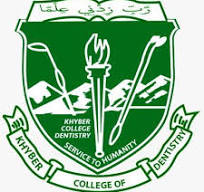KNOWLEDGE, ATTITUDES AND PRACTICES REGARDING DENTAL ETHICS AMONG STUDENTS AND RECENT GRADUATES IN A PUBLIC SECTOR DENTAL HOSPITAL
DOI:
https://doi.org/10.33279/jkcd.v15i03.819Keywords:
Dental Ethics, Ethical Practice, KAP, PMDC code of ethicsAbstract
Objectives: The purpose of this study was to examine undergraduates and recent dentistry graduates ethical knowledge, practices and views of the ethical atmosphere of the institution.
Materials and Methods: A questionnaire based descriptive cross-sectional study was carried out on a total of 250 students from 2nd year, 3rd year, Final year, House officers and postgraduate students of the institution. There were only closed-ended questions on the 20 self-administered items in the questionnaire. After that, SPSS version 26.0 was used to analyse the returned questionnaires. A total of 250 applicants received questionnaires. For every piece of data that was gathered, descriptive analysis was done, and the Chi squared test was used.
Results: The study population was female dominant (n=135) (54%). The fi ndings showed that merely 78% of the applicants knew of the PMDC's code of ethics, and 10% knew about the global code of ethics. On the other hand, the applicants' views were observed to be favourable 90%, demonstrating that students were typically kind and committed to their jobs. Furthermore, a positive attitude toward dental care ethics procedures was observed.
Conclusion: As students have shown a positive attitude toward their profession and ethical dentistry, more focus should be allocated to support dental students in terms of dental ethics education at educational in stitutions.
References
Sarfaraz S, Shabbir J, Mudasser MA, Khurshid Z, Al-Quraini AAA, Abbasi MS, et al. Knowledge and attitude of dental practitioners related to disinfection during the COVID-19 pandemic. In MDPI; 2020. p. 232.
Parakh A, Mody J, Sahasrabudhe R, Sotaa B, Balhara S, Fernandes G. Evaluation of the Knowledge & Attitude of Dental Practitioners on Green Dentistry in Navi Mumbai–A Cross Sectional Study. J Dent Med Sci. 2020;19:34–42.
Farsi NJ, Merdad Y, Mirdad M, Batweel O, Badri R, Alrefai H, et al. Oral health knowledge, attitudes, and behaviors among university students in Jeddah, Saudi Arabia. Clinical, cosmetic and investigational dentistry. 2020;515–23.
Bakaeen LG, Masri R, AlTarawneh S, Garcia LT, AlHadidi A, Khamis AH, et al. Dentists’ knowledge, attitudes, and professional behavior toward the COVID-19 pandemic: A multisite survey of dentists’ perspectives. The Journal of the American Dental Association. 2021;152(1):16–24.
Duruk G, Erel ZB. Assessment of Turkish dentists’ knowledge about managing avulsed teeth. Dental Traumatology. 2020;36(4):371–81.
Al-Mutlaq R, Al-Feraih B, Al-Aidroos H, Al-Neema H, Al-Asmari R, AlBalawi R, et al. Knowledge of dental students and dentists towards dental ethics in Riyadh city: a cross-sectional study. J Healthcare Sci. 2021;1:35–44.
Reddy RS, Ramya K, Raju M, Rayudu GS, Kiran C, Jyothirmai K. Knowledge, awareness and attitudes about research ethics among dental professionals in a dental institution of south India. Journal of Education and Ethics in Dentistry. 2013;3(1):34–9.
Jang JH, Hwang YS, Lee SM. Level of perception of professional ethics education and the knowledge and attitudes related to medical ethics of students and professors in dental hygiene. Journal of Korean society of Dental Hygiene. 2021;21(1):77–88.
El-Dessouky HF, Abdel-Aziz AM, Ibrahim C, Moni M, Abul Fadl R, Silverman H. Knowledge, awareness, and attitudes about research ethics among dental faculty in the Middle East: A pilot study. International journal of dentistry. 2011;2011(1):694759.
Nassar AA, Salama RI. Medical Ethics knowledge and attitude among Dental students from two universities in the Middle East. The Open Dentistry Journal. 2022;16(1).
Humayun A, Fatima N, Naqqash S, Hussain S, Rasheed A, Imtiaz H, Imam SZ. Patients’ perception and actual practice of informed consent, privacy and confidentiality in general medical outpatient departments of two tertiary care hospitals of Lahore. BMC medical ethics. 2008 Dec; 9(1):14.
Tenenbaum A, Moutel G, Wolikow M, Vial-Dupuy A, Azogui-Levy S. Implementation of a medical ethics course in undergraduate dental education and assessment of knowledge and attitudes. Journal of International Society of Preventive and Community Dentistry. 2020;10(5):569–78.
Rani S, Dhawan P, Kumar A, Kumar H, Tripathi R. Knowledge, awareness and decision making of population visiting north indian institute towards dental implant as a treatment modality: a cross-sectional study. International Journal of Adolescent Medicine and Health. 2024;36(2):151–60.
Siddiqui Y, Parvez K, Askari R, Parvez K, Noor-ul-Ain QS. Dental ethics (a KAP study). Int J Dent Oral Health. 2020;6(3):48–53.
Shiraz B, Shamim MS, Ahmed A. Medical ethics in surgical wards: knowledge, attitude and practice of surgical team members in Karachi. Indian journal of medical ethics. 2005;2(3):94–6.
Imran N, Haider II, Jawaid M, Mazhar N. Health ethics education: knowledge, attitudes and practice of healthcare ethics among interns and residents in Pakistan. Journal of Postgraduate Medical Institute. 2014;28(4).
Downloads
Published
How to Cite
Issue
Section
License
Copyright (c) 2025 Wafa Saleem, Arif Ullah Khan, Fatima Wahab, Aasim Masood, Sheema Hamayun, Umar Nasir

This work is licensed under a Creative Commons Attribution-NonCommercial 4.0 International License.
You are free to:
- Share — copy and redistribute the material in any medium or format
- Adapt — remix, transform, and build upon the material
- The licensor cannot revoke these freedoms as long as you follow the license terms.
Under the following terms:
- Attribution — You must give appropriate credit , provide a link to the license, and indicate if changes were made . You may do so in any reasonable manner, but not in any way that suggests the licensor endorses you or your use.
- NonCommercial — You may not use the material for commercial purposes .
- No additional restrictions — You may not apply legal terms or technological measures that legally restrict others from doing anything the license permits.










